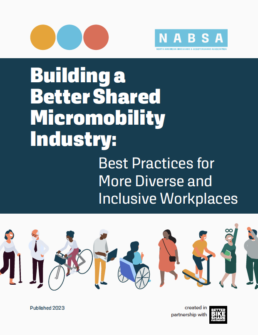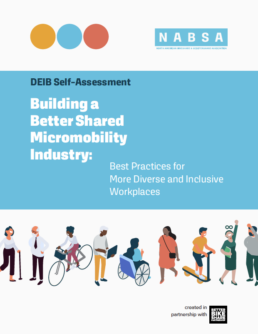Diversity, Equity, Inclusion, and Belonging
When we talk about DEIB — Diversity, Equity, Inclusion, and Belonging - in the context of shared micromobility, we refer to a holistic approach that prioritizes varied experiences, fair opportunities, inclusive environments,
and a sense of community.

Building a Better Shared Micromobility Industry:
Best Practices for More Diverse and Inclusive Workplaces
Published in September 2023, this resource was created by the North American Bikeshare and Scootershare Association (NABSA) and the Better Bike Share Partnership (BBSP).
This toolkit is a comprehensive guide for organizations operating within the shared micromobility industry. This pivotal resource offers invaluable insights into best practices for cultivating a diverse workplace and fostering a culture ingrained with the values of diversity, equity, inclusion, and belonging.
Each toolkit section is enriched with Action Steps, Case Studies, Resources, and a Self- Assessment to provide tangible strategies to build a more diverse team and promote a more equitable organization.
Each toolkit section is enriched with Action Steps, Case Studies, Resources, and a Self- Assessment to provide tangible strategies to build a more diverse team and promote a more equitable organization.

Recruitment and Outreach
This section delves into the best practices for attracting a diverse pool of candidates. It is designed to help your organization broaden its outreach and draw in candidates from various backgrounds and experiences.

Hiring
After successfully recruiting diverse candidates, the next step is hiring. This segment focuses on creating an equitable hiring process, providing tips on crafting inclusive job descriptions, conducting unbiased interviews, and making fair decisions.

Retention
Retaining a diverse workforce and cultivating a sense of belonging can be even more complex than recruiting and hiring. This section provides strategies for retaining diverse talent, including fostering an inclusive and supportive work environment, promoting work-life balance, and ensuring equitable access to opportunities and resources.

Leadership Accountability
In the shared micromobility industry, leadership is essential for establishing and embodying DEIB principles, setting the tone for workplace culture, and fostering an environment where diversity is valued and everyone feels a sense of belonging. Leaders are responsible for actively diversifying the workforce, ensuring equitable opportunities, and continually evaluating and adjusting DEIB strategies.

Workplace Culture
Workplace culture significantly influences staff satisfaction, performance, and retention. This segment will guide you in cultivating an inclusive, respectful, and welcoming workplace culture that values diversity and fosters a sense of belonging.

Tracking Progress and Measuring Impact
The final section deals with accountability. Here, you’ll learn how to keep your organization accountable for its DEIB commitments. This section includes strategies for regularly monitoring and assessing DEIB efforts and the importance of transparent communication.

Professional Development
Professional development opportunities are essential for employees’ personal growth and career advancement, and in the context of DEIB, they ensure all individuals, regardless of their background, have equal opportunities to succeed. In the shared micromobility industry, these opportunities can include specialized training on new technologies or trends, which can in turn forster a more skilled, diverse workforce and enhance an organization’s adaptability in our ever-evolving industry.
Maintaining a Commitment to DEIB
DEIB work is ongoing and constantly evolving. Best practices are intended to provide guidance to organizations with varying levels of familiarity with DEIB. Taking Self-Assessments now can provide a baseline from which to compare future efforts against. Maintaining DEIB practices in your workplace requires upkeep, commitment, and the willingness to revisit and refine internal practices. Consider this toolkit a resource your organization can continually return to for next steps, best practices, and self-evaluation.

DEIB Self Assessment
The DEIB Self Assessment tool will help you evaluate your organization’s efforts in key DEIB areas by tallying up each section individually, you can identify the areas where your organization shines and the areas that need the most attention. This targeted approach can help guide your DEIB strategies moving forward. Keep in mind that DEIB is a journey, not a destination. Continuous improvement, learning, and development are key. Regardless of your score, always strive for more inclusive and equitable practices.
Resources
Glossary of Terms
DEIB terminology is continually expanding and evolving. As a result, there are terms that may not be included on this list. Organizations are encouraged to build onto this glossary.
Workforce Diversity Wednesday
As part of NABSA’s update to the toolkit and strategy to increase diversity in the shared micromobility workforce at all levels, we are launched a blog and social media series that spotlights jobs in shared micromobility throughout the year. We call this series “Workforce Diversity Wednesdays,” where NABSA posts interviews with individuals in the shared micromobility industry highlighting their work and role with the hopes of encouraging more diversity and representation in the field.
2019 Workforce Diversity Toolkit
In 2019, NABSA, launched the Workforce Diversity Toolkit for Bikeshare and Shared Micromobility. This resource was created in cooperation with the Better Bike Share Partnership (BBSP) and the included case studies of best practices from the industry, questions for self-evaluation, and further resources. This toolkit provided a building block for what is now Building a Better Shared Micromobility Industry: Best Practices for More Diverse and Inclusive Workplaces.
